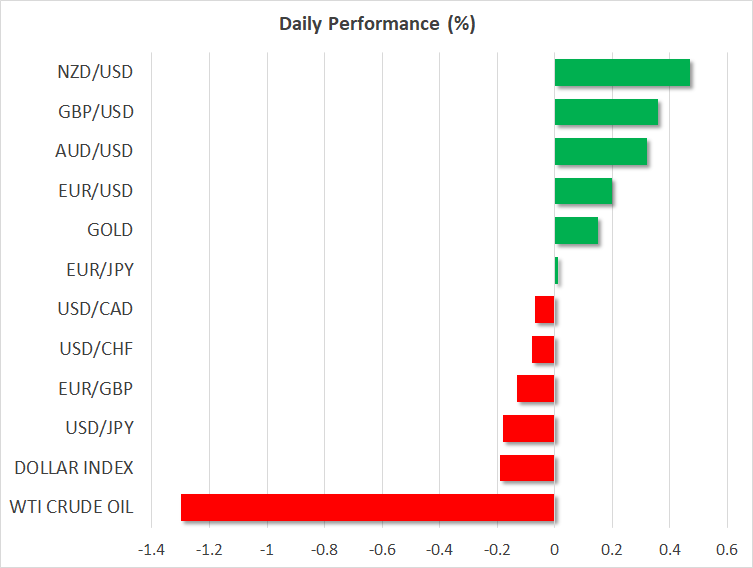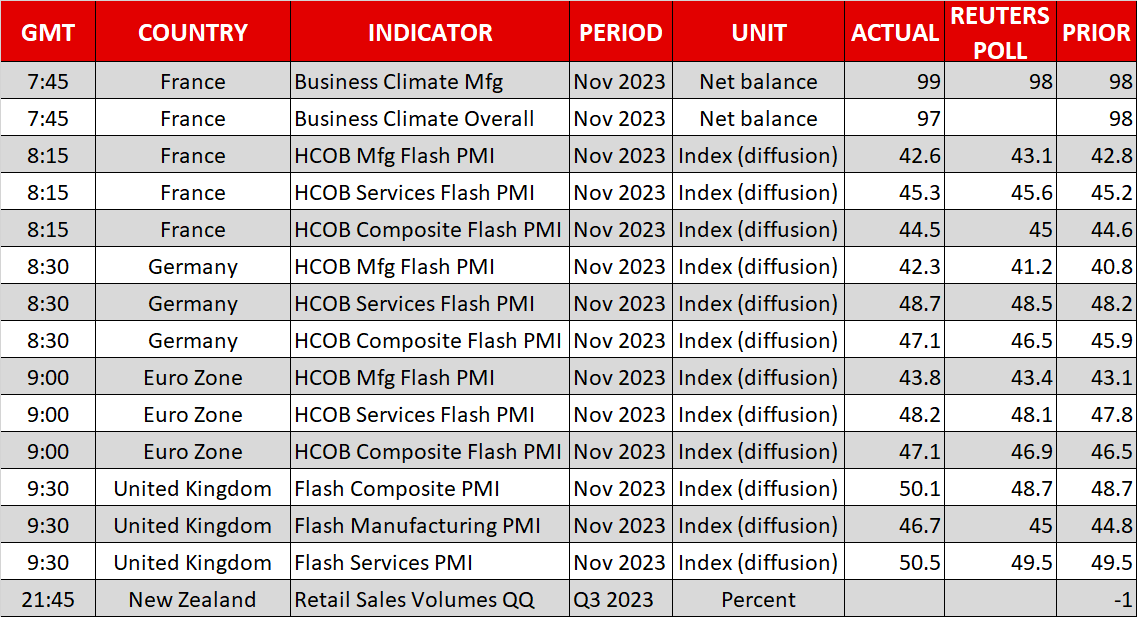- Oil plunges on OPEC+ meeting delay, sparking rally in US dollar
- But dollar resumes decline today as rivals advance on easing gloom
- Stocks mostly positive in holiday-thin trade

Oil prices whipsaw on OPEC+ speculation
Markets were hit by some unforeseen turbulence on Wednesday as oil prices plummeted on OPEC’s announcement that Sunday’s meeting has been postponed to November 30. This month’s output decision was already building up to be a major one as the OPEC and non-OPEC alliance was expected to extend the latest production cuts into 2024. But the delay has spurred speculation that member countries are struggling to reach an agreement, casting doubt about OPEC+’s commitment to maintaining tight supply.
Oil futures tumbled by more than 5% at one point, with rising US crude inventories exacerbating the selloff, before recouping most of the losses. Reports later in the day that the disagreement mainly involved three African countries who are seeking to raise their 2024 production quotas eased concerns of deeper differences within the cartel.
Still, even if it’s simply a matter of more time needed to hash out a deal, there seems to be a reluctance within OPEC+ for additional cuts and it’s unclear how long Saudi Arabia will be willing to carry most of the burden of balancing the oil market by itself.
That’s why oil prices have come back under pressure today, with both WTI and Brent crude futures slipping by around 1%.
Dollar storms higher as oil sinks before easing back
The volatility hasn’t been confined to oil prices, however, as OPEC+’s decision has implications beyond the oil market as it could either quicken or stall the progress for central banks on getting inflation all the way down to 2%. With many traders already anticipating that rate cuts are just months away, yesterday’s drop in oil prices fuelled those bets.
This boosted the US dollar as high energy prices are seen as being less of a factor in keeping inflation elevated in the United States than in other places such as Europe and Japan. Further falls in oil prices could potentially weaken the case for restrictive policy for the likes of the ECB and reduce the urgency for the Bank of Japan to exit stimulus early.
Eurozone and UK PMIs offer glimmer of hope
Nevertheless, the greenback was softer today as the euro and pound were lifted by better-than-expected flash PMI numbers for November. Although it’s too soon to rule out a recession, there are tentative signs that the Eurozone downturn is bottoming out, while the UK economy even managed to grow slightly in the first half of November.
The pound is being additionally bolstered by yesterday’s Autumn budget statement by UK finance minister Jeremy Hunt, who cut taxes for workers by slightly more than expected as well as announced a series of measures aimed at boosting growth.
Aussie up on more hawkish talks, yen sags
The Australian dollar was another strong performer on Thursday, as there was yet more hawkish rhetoric coming from RBA Governor Michele Bullock, while there is growing optimism that China’s embattled property sector will be able to ride out the storm following the latest support measures announced by Beijing.
The yen, which fell the most yesterday against the US dollar, was trading only marginally higher today. Investors will be watching the latest CPI figures due overnight in Japan for fresh clues on the inflation path.
Positive mood holds for stocks as yields drift lower
In equities, European and Asian shares mostly edged higher amid light trading volumes as both US and Japanese markets are closed today. Wall Street managed to close in positive territory on Wednesday before the Thanksgiving break as Treasury yields remained pinned down. Even with Nvidia’s 2.5% drop, the S&P 500 and Nasdaq Composite held within their current upward trajectory on hopes that the Fed is done hiking rates and that the next move will be down.
Yet, there’s plenty of room for disappointment down the line as the Fed is unlikely to cut rates anytime soon as long as the economy remains in good shape and yesterday’s data provided more evidence of that. Initial jobless claims fell more than expected last week, while consumer inflation expectations climbed for the second month in a row according to the University of Michigan’s closely watched survey.
